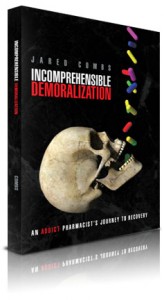 I’m a great fan of addiction memoirs. I’ve read criticism of addiction memoirs beginning with the refrain, “Oh, great another…” But while it’s true that addicts’ stories overlap, and even the life of one addict is repeating the same behavior over and over again, these narratives are often compelling. The main reason is honesty. One of the things missing from much fiction and narrative memoirs is someone willing to make themselves look bad – to reveal a darker side of their personality. By design, addiction memoirs are written by authors who are more than willing to reveal their faults. There would be no other way to write the book. So these books have a refreshing honesty.
I’m a great fan of addiction memoirs. I’ve read criticism of addiction memoirs beginning with the refrain, “Oh, great another…” But while it’s true that addicts’ stories overlap, and even the life of one addict is repeating the same behavior over and over again, these narratives are often compelling. The main reason is honesty. One of the things missing from much fiction and narrative memoirs is someone willing to make themselves look bad – to reveal a darker side of their personality. By design, addiction memoirs are written by authors who are more than willing to reveal their faults. There would be no other way to write the book. So these books have a refreshing honesty.
And Incomprehensible Demoralization: An Addict Pharmacist’s Journey to Recovery is a very good member of the genre. Perhaps not on the scale of Tony O’Neill’s Digging the Vein or Frank Daniels’ Futureproof – but both those books were sold as novels, even if based on real life. There might be some value to that because I.D. reads more like a series of confessional blog entries (albeit long entries), rather than something that has a long narrative arc.
First, the story: Jared Combs wasn’t an everyday street drug addict. He was a pharmacist – so his dealer was his job. This is a unique take on the subject and one that is not often covered. Jared Combs has an incredibly vivid memory of his life as an addict, which is incredible considering how inebriated he was. This may be the reason that O’Neill and Daniels are compelled to release their stories as a novel, as perhaps they can’t be sure if their memories about a time when you’re basically trying to obliterate your memory can be very accurate. But I’ll take Combs’ word for it because his descriptions are so vivid and don’t appear overly embellished – compared to, say, James Frey, who invented things that seemed highly dubious.
One thing that may be missing from Combs’ book, however, is a sense of self-reproach. You get the sense that he thinks the self-reproach is implied. All he has to do is report on bad behavior and it’s a given that he thinks this behavior is wrong. But this point of view doesn’t always come across effectively. For example, he says after getting released from jail,
At the motel, Darcey [his wife] and I got into a huge fight over the beer I had bought. She just didn’t understand that it was necessary to drink in celebration of such an occasion. She never really understood these things very well. Another moment destroyed that should have been celebratory.
Sometimes he does let in some self-judgment, by saying: “The level of stupidity displayed by this act astounds and befuddles me today.” But often there is a confusion of his point of view – is he writing as a drug addict trying to rationalize his bad behavior, or is he looking back in amazement about the things he did? It’s not always clear. Another case: he talks about his annoyance with pharmacy customers and how pushy they can be. Again, it is unclear who’s voice this is: a general statement about pharmacy customers written by a sober narrator or a statement by a drug addict about what drove him to get high. It would be satisfying for him to voice what every reader is thinking.
That’s the major criticism – an uneven voice and perspective. That aside, this is a page turner of a book. It’s an amazing window into how low people are willing to fall, but also an uplifting story about how they can rise back up again. Combs is an engaging writer with an incredibly engaging story. You won’t just learn about pharmaceutical drug addiction and the potential for recovery, but something about being a pharmacist as well. If you have an interest in addiction memoirs, add this to a growing list of some of the more interesting books being written today.
More on his story:
Visit JaredCombs.com.
Get an Editorial Review | Get Amazon Sales & Reviews | Get Edited | Publish Your Book | Enter the SPR Book Awards | Other Marketing Services






















Leave A Comment